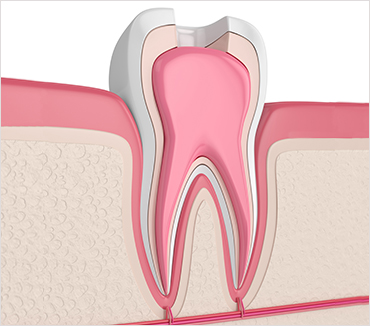Endodontic Treatments at Gentle Dental
At Gentle Dental, we provide specialized endodontic treatments designed to save your natural teeth and alleviate dental pain. Our experienced endodontists use advanced techniques and state-of-the-art technology to offer the best possible outcomes in a comfortable setting.
Root Canal Therapy
Root canal therapy involves the removal of the infected or inflamed pulp from within your tooth, followed by careful cleaning, disinfecting, and shaping of the root canals and then sealing them with a biocompatible material. This treatment, performed by our skilled root canal dentist, alleviates pain and can save your tooth from extraction, preserving your natural smile.
Endodontic Re-Treatment
Sometimes a tooth that has undergone a root canal procedure may not heal properly or could become reinfected. Endodontic re-treatment, another procedure in which our root canal dentist excels, involves reopening the tooth to remove the previous root canal filling materials, cleansing the canals, and refilling them. This process helps resolve any ongoing infection or pain and is critical to root canal infection treatment.
Endodontic Surgery
When non-surgical root canal treatment is insufficient or has failed, endodontic surgery, such as an apicoectomy, may be necessary. This procedure involves making a small incision in the gum tissue to examine the underlying bone and remove any inflamed or infected tissue. The end of the root is also sealed during surgery to prevent further infection.
Sedation Endodontics
For patients who experience anxiety or fear about dental procedures, sedation endodontics offers a way to receive treatments comfortably. We provide various sedation options, from mild sedatives to help you relax to more profound methods that allow you to sleep through the procedure.
Treatment for Traumatic Dental Injuries
Our clinic specializes in treating dental injuries such as dislodged or avulsed (knocked-out) teeth. Timely endodontic treatment can often save injured teeth, preventing long-term damage and the need for more extensive dental work.
Diagnosis and Treatment of Cracked Teeth & Fractures
Cracked teeth can present various symptoms, including erratic pain when chewing and temperature sensitivities. Our endodontists, also known as root canal doctors, are skilled in diagnosing and treating these issues, often involving precise root canal therapy or other specialized treatments to preserve the tooth and prevent further damage.
Diagnosis of Dental Pain
Identifying the precise cause of dental pain can be complex due to the diverse and overlapping nerve pathways in the mouth. Our expert endodontists use advanced diagnostic techniques to pinpoint the source of pain and determine the appropriate treatment to resolve it, ensuring relief and restoration of oral health.




